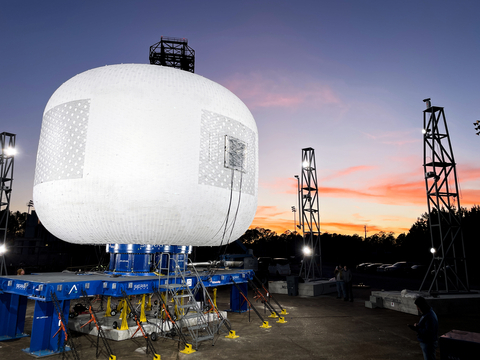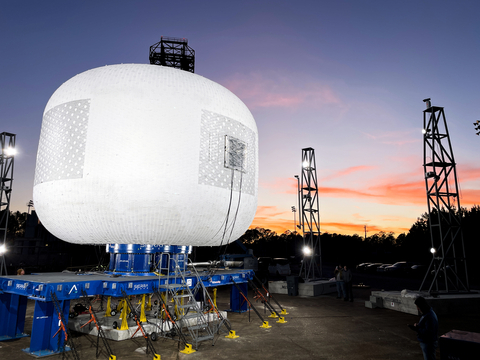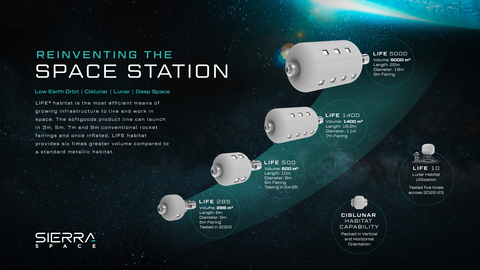LOUISVILLE, Colo.--(BUSINESS WIRE)--Sierra Space, a leading commercial space-tech company and next generation defense-tech prime building a platform in space to benefit life on Earth and protect the freedom of economic activity in the Orbital Age®, announced today that its expandable space station technology is scheduled for its seventh key validation test, and second full-scale structural test, this June at NASA’s Marshall Space Flight Center in Huntsville, Ala.
Completion of successful testing next month will accelerate this innovative technology to on-orbit operations. The test article in the company's historic first full-scale burst test last December reached 77 psi before it burst, which well exceeded (+27%) NASA’s recommended level of 60.8 psi (maximum operating pressure of 15.2 psi multiplied by a safety factor of four). Sierra Space is the only space company that has advanced to full-scale structural testing of commercial space station technology.
The company's second full-scale test next month will be another Ultimate Burst Pressure (UBP) test to validate the technology’s ability to perform flawlessly in the unforgiving conditions of space. The test article, currently in assembly, is equivalent to one third the volume of the entire International Space Station (ISS).
The upcoming test will also mark another milestone in Sierra Space’s co-development of Orbital Reef with Blue Origin, along with the technical maturation of its LIFE® (Large Integrated Flexible Environment) product line of expandable “softgoods” modules. The modules are launched (packed) inside a standard rocket fairing and can expand up to 6x in size once on orbit. The LIFE pressure shell is constructed of high-strength woven fabric materials, or softgoods, consisting primarily of Vectran, which form rigid structures when pressurized on orbit.
In addition to this technology being used by Sierra Space and Blue Origin as part of their Orbital Reef partnership, it will also be employed by Sierra Space for the company’s pathfinder space station, which will be focused on biotech use cases.
“At Sierra Space we are intent on shaping a new era in humanity’s exploration and discovery in Low Earth Orbit and beyond,” said Sierra Space CEO Tom Vice. “Our expandable space station technology combined with our highly reusable Dream Chaser spaceplane significantly decreases the cost of in-space infrastructure, opening the door to a commercialized LEO. With these technologies now rapidly approaching operational phases, we are seeing the realization of a new era in humanity’s ability to live and work in space in the Orbital Age.”
With this impending test, Sierra Space will have completed seven key stress tests in just two years: five of them on subscale test articles and two UPB tests on full-scale LIFE 285 units. These tests support the LIFE softgoods product line that continues to expand and push this game-changing technology to new heights. Earlier this year, Sierra Space introduced LIFE 500, which is 500 cubic meters of volume in a single launch inside a five-meter rocket fairing. Design and test planning have begun for this next expandable article with a planned burst test in Q1 of 2025. With the introduction of the LIFE 500, Sierra Space's expandable product line now consists of the LIFE 10, LIFE 285 and LIFE 500 units, with larger LIFE 1400 and LIFE 5000 modules on the roadmap when seven and nine-meter-sized rocket fairings become available on larger launch vehicles currently in development.
“Sierra Space’s expandable space station technology, based on the LIFE habitat product line, leverage a discriminating technology that has no equal. The product line-based solution is built upon architecture and geometry that utilize low volume launches that become high volume space stations,” said Sierra Space Vice President of Space Destinations, Shawn Buckley. “Being able to rapidly apply lessons learned at the component level along with integrated system results, enables Sierra Space to quickly design an increased number of habitat volume solutions for any market – LEO, cislunar, lunar and deep space.”
Sierra Space is involved in several NASA-sponsored initiatives that directly support space commercialization: CCSC-2 (Collaborations for Commercial Space Capabilities), CLD (Commercial LEO Destinations), and NextSTEP (Next Step Technologies for Exploration Partnerships); all of these programs provide NASA insight into the ongoing Sierra Space development activities along with collaborative efforts in developing and testing materials and integrated systems for space applications. Sierra Space is dedicated to these partnership- and resource-sharing activities that provide value-added synergies as the company leads space habitation in the emerging Orbital Age.
Sierra Space is also continuing its LIFE10 development and testing campaign with two additional tests planned for 2024. LIFE10 unique ability to “bi-directional” packed provides a small compact size at launch in diameter, length, volume, and mass making it a perfect solution for space station use case solutions – science airlock, storage facility and along with a discriminating technology for lunar surface applications.
About Sierra Space
Sierra Space is a leading commercial space company at the forefront of innovation and the commercialization of space in the Orbital Age®, building an end-to-end business and technology platform in space to benefit life on Earth. With more than 30 years and 500 missions of space flight heritage, the company is reinventing both space transportation with Dream Chaser®, the world’s only commercial spaceplane, and the future of space destinations with the company’s inflatable and expandable space station technology. Highly scalable and flexible, this innovative “softgoods” technology will define a new generation of space stations. Sierra Space also builds and delivers a host of systems and subsystems across solar power, mechanics and motion control, environmental control, life support, propulsion and thermal control, offering myriad space-as-a-service solutions for the new space economy.





